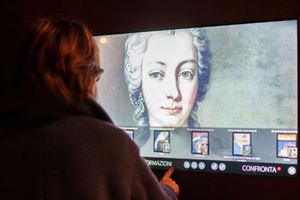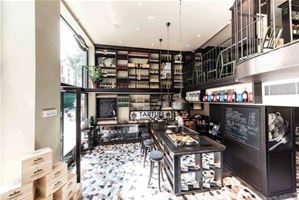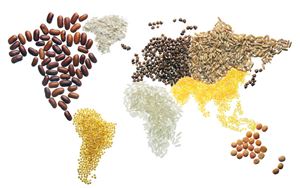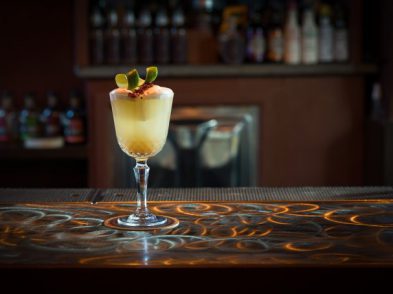One of the most original and challenging artists to emerge from post-war Italy, Italo Calvino quickly became a central figure in Italian culture through his active involvement in an array of disciplines—from journalism and politics to intellectually-oriented publishing and inventive literature. One of the most widely read, studied and admired Italian fiction writers today, this incredible ‘man of letters’ was both a product of and influence on twentieth-century Italy.
Calvino’s literary legacy spans four decades, amassing a vast readership around of the globe. His collection of fairytales is a favorite among Italian primary schoolchildren while his deceptively simple prose never ceases to delight the adult booklover.
The son of Italian botanists, Calvino was born in Cuba, in the city of Santiago de las Vegas, on October 15, 1923. The family moved back to Italy in 1925 and settled in San Remo, a small coastal town in Liguria, where he spent a childhood surrounded by his progressive family of scientists, nature lovers and liberal thinkers.
Calvino’s first, and perhaps most influential childhood memory was that of a revolutionary socialist being ferociously beaten by Fascist militia. The image haunted the young Calvino and would eventually fuel the political and social impetus of his neorealist vision in the post-war period. The early 1940s were the years of the Fascist resistance, and as a young adult Calvino found himself more and more attracted to the revolutionary ideals of the emerging communist movement. He joined the then-clandestine Italian Communist Party (PCI) and fought for the partisan resistance from 1943 to 1945. During this period of solitude, exile and combat, he began to read intensely, laying the foundations of his unique literary vision.
Shortly after the war, he enrolled in the literature department at the University of Turin, located in the center of the bustling city where the strong worker and socialist movements had attracted a host of leftist intellectuals from all walks of life. During his studies, he supported himself by contributing to several communist and Marxist publications, including Elio Vittorini’s literary magazine Il Menabò. Two years later he completed his degree with a thesis on Joseph Conrad, and in 1947 he published his first novel, Il sentiero dei nidi di ragno, which depicts the Italian resistance through the eyes of a young boy. The result was a combination of neorealism with the fantastic and surreal.
While in Turin, he began a collaboration with local publisher Einaudi, a partnership that would continue for the rest of his career. While at Einaudi he formed close working relationships and intimate friendships with an array of fellow intellectuals and writers that included Cesare Pavese, Elio Vittorini, Natalia Ginzburg, Norberto Bobbio and Carlo Muscetta. Vittorini would later become Calvino’s friend and mentor.
Deeply disappointed by the Soviet Union’s military policies in Eastern Europe, Calvino abandoned the Italian Communist Party in 1957. In the years that followed, his writing gradually diverged from the dominant neorealist vision to assume its own distinctive and individual voice. In 1963 he published La giornata di uno scrutatore, a short political satire that marked the end of his neorealist period.
Inaugurating a new literary style meshing the allegorical and the purely fantastic, he then published some of his most celebrated works, including a collection of fables, Marcovaldo, and the much-acclaimed trilogy I nostri antenati.
When, in 1967 Calvino moved to Paris with his Argentinean wife, Chikita Singer, and their daughter Giovanna, he began an association with prominent French literary theorists Claude Levi-Strauss and Roland Barthes, a relationship that profoundly influenced his later work. He incessantly sought ‘a literature which breathes philosophy and science but keeps its distance and dissolves, with a slight puff of air, not only theoretical abstractions but also the apparent concreteness of reality’. A series of postmodernist novels from this period gained him international acclaim: Cosmicomiche (1968), Città invisibili (1972) and Se una notte un viaggiatore (1979). Calvino died in Siena, Italy, on September 19, 1985, of a cerebral hemorrhage.
Calvino’s seemingly clear, limpid language, with its multiple, overlapping layers of meaning, profoundly changed twentieth-century Italian literature. The politically driven narrative that characterized his earlier novels later became an individual search that confronted the complexities and contradictions of modern society, probing the human condition and the role of man within the disordered cosmos.
Calvino’s critique of his work provides the most candid interpretation of his lifelong literary production: After forty years of writing fiction, after exploring various roads and making diverse experiments, the time has come for me to look for an overall definition of my work. I would suggest this: my working method has more often than not involved the subtraction of weight. I have tried to remove weight, sometimes from people, sometimes from heavenly bodies, sometimes from cities; above all I have tried to remove weight from the structure of stories and from language.







